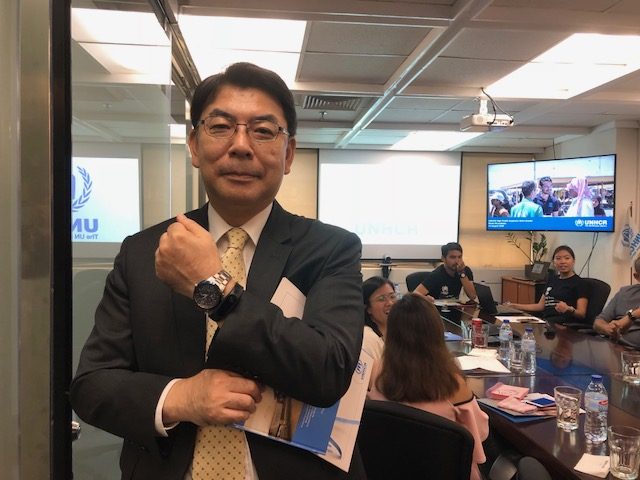Shinji Kubo, the UN High Commissioner for Refugees’ newly appointed representative to the Philippines, wears a nondescript black fitness tracker beside the wristwatch on his left arm. He has never taken it off since April 2017.
It is his constant reminder of a volunteer colleague (name withheld for security reasons) based in Syria who assisted him during his recent stint in Bangladesh. More than a million Rohingya refugees from Myanmar have fled to Bangladesh to seek refuge from ethnic persecution from the Buddhist-dominated Myanmar military.
The international refugee agency oversees donations given from all over the world and coursed through the UN to the Rohingya.
“My deputy was based in Dhaka (capital of Bangladesh) with his wife and two children but the other family members at one point decided to [return] to Syria because they have [relatives there],” Kubo said.
The deputy was obviously distressed by the situation, knowing how volatile the situation has been in Damascus since 2011. It did not help the situation that the deputy’s brother worked as a journalist in Washington DC—a job that could put both journalist and family members at risk in Syria should authorities are informed.
After a year of working together, Kubo said his deputy decided to follow his family to Syria. The deputy remains there until now, Kubo said, still attempting to bring his children to a safer place.
“Before he went, he left me this in April 2017,” Kubo said while showing off the tracker. “It shows how many steps you’ve made, how many hours you slept, if it was a good sleep.”
The deputy asked Kubo to “remember me and my family in Syria” every time he glanced at the tracker. The deputy left Bangladesh in June, Kubo a month after.

While the tracker is a memento of lighter moments, Kubo’s job at the UNHCR, in Bangladesh more specifically, deals with caring for displaced Muslim Rohingyas avoiding military harassment. Global news networks have repeatedly told tales of murder and rape.
“Working in Bangladesh until January 2018, I had opportunities to work closely with the Bangladeshi government and other humanitarian players to address the situation of Rohingyas,” Kubo said.
“Unfortunately, the situation has continued to be very dramatic and challenging for everyone. But I learned that people have a strong resilience and demonstrate the ability to live,” he added.
Kubo described the situation of Rohingyas in Bangladesh as “so dramatic that whatever we do was insufficient and too late, but we still managed to avoid a catastrophic situation because people managed to survive on their own. They just needed our advice and a bit of humanitarian support.”
The UNHCR representative also noted from experience that refugees, in general, manage successfully when given the chance to decide their coping strategies and survival.
“The only missing link is our willingness to listen to them and giving them the opportunities to exercise their resilience…a clear link between (the refugee) community and ourselves (who are) privileged to be able to support,” he added.
The UNHCR recently invited Filipino journalist Atom Araullo to visit Syrian refugees in Jordan as a High Profile Supporter.
Kubo explained that Araullo’s familiarity among Filipino audiences makes it easier for him to deliver information about a distant refugee situation across the globe. “A person on the ground makes it easier for people to get motivated to understand and have more interest,” Kubo said.
Araullo had a press conference at the UNHCR’s Philippine office in Makati recently.
Jordan, he said, currently hosts 650,000 Syrian refugees. Araullo visited Azraq, one of the refugee camps that has 36,000.
The journalist noted that unlike other camps, Azraq is “well-organized. It has a clinic, a grocery, a community center, a football field, and a basketball court.”
Araullo added Azraq has “its own solar power plant and is now expanding to meet the energy demands of the refugees.”
“An important part of (the refugees’) rehabilitation is being able to access these services that make them feel they are one community and that they are able to use their talents to help themselves and also help others,” he said.
Araullo pointed out similarities between Syrian refugees and the Filipino refugees he covered in Marawi- the progressive city in Mindanao that was destroyed by ISIS-supporting Abu Sayyaf bandits.
“It’s really astonishing that people who have little have the most to give. Jordan is not a big country. In fact, it is just an emerging market yet they (Jordanians) don’t hesitate to give help, accept refugees and even give more support,” he said.
“That is one of the things I witnessed from the Jordanians that reminded me of Filipinos back home. The Philippines is a developing country and despite that, Filipinos proved themselves to be really kind-hearted and generous and willing to lend a helping hand especially when called upon,” the journalist added.
Araullo said his experiences in Marawi and Jordan showed “how that kind of tradition and being open spans different cultures. That’s all the more reason that we should extend our support in solidarity with Syrian refugees but also with the Jordanian people who are continuing to support refugees coming into their country.”
The journalist concluded his presentation with an appeal for solidarity with Syrian refugees by providing support for their humanitarian needs.
UNHCR appreciates financial assistance to help provide critically-needed, life-saving aid, protection, and solutions to the most vulnerable. Donate here.
Get more stories like this by subscribing to our newsletter here.